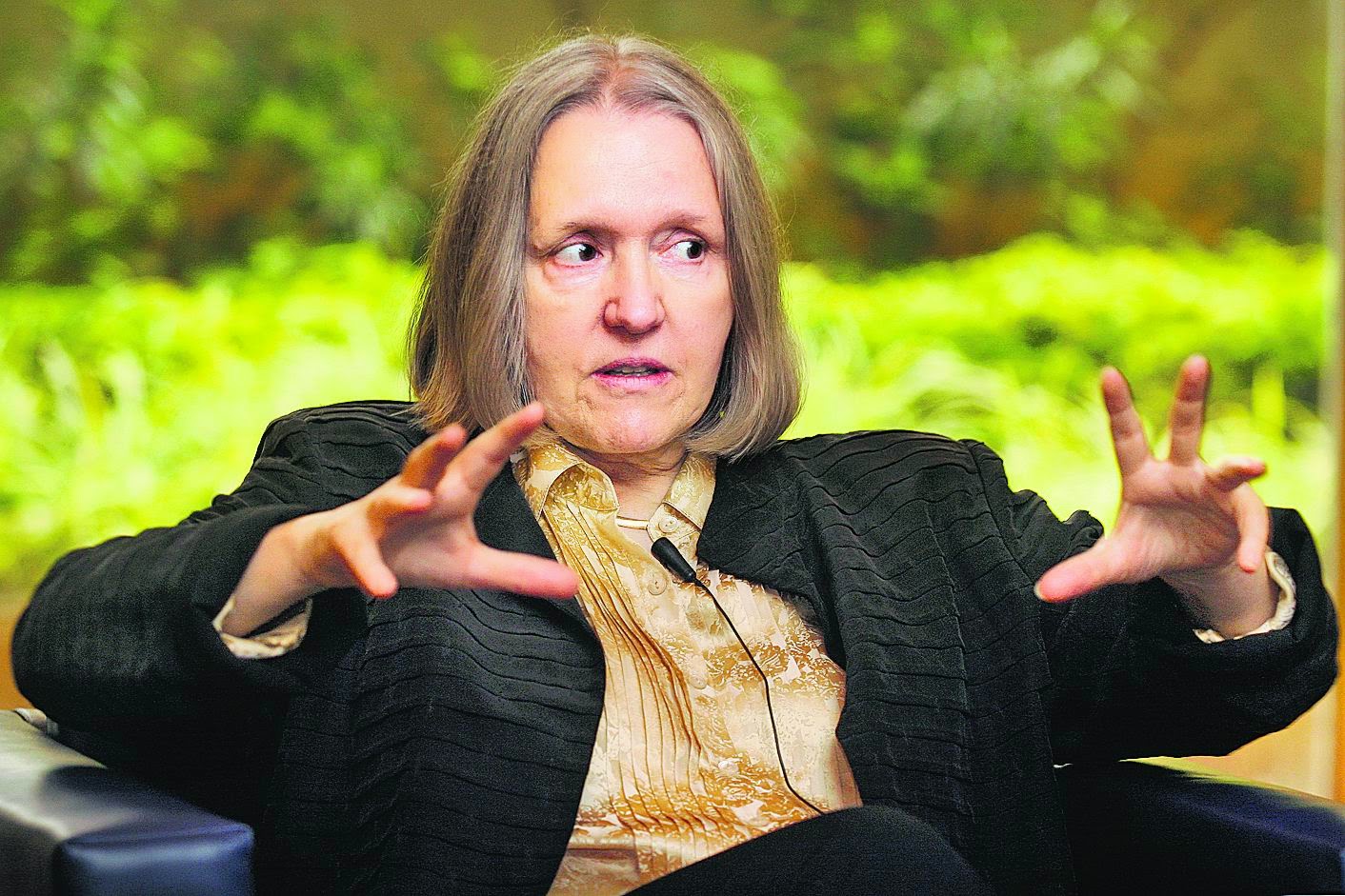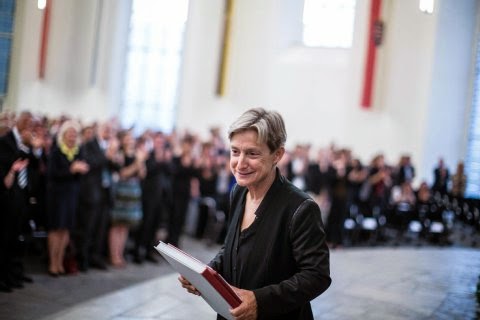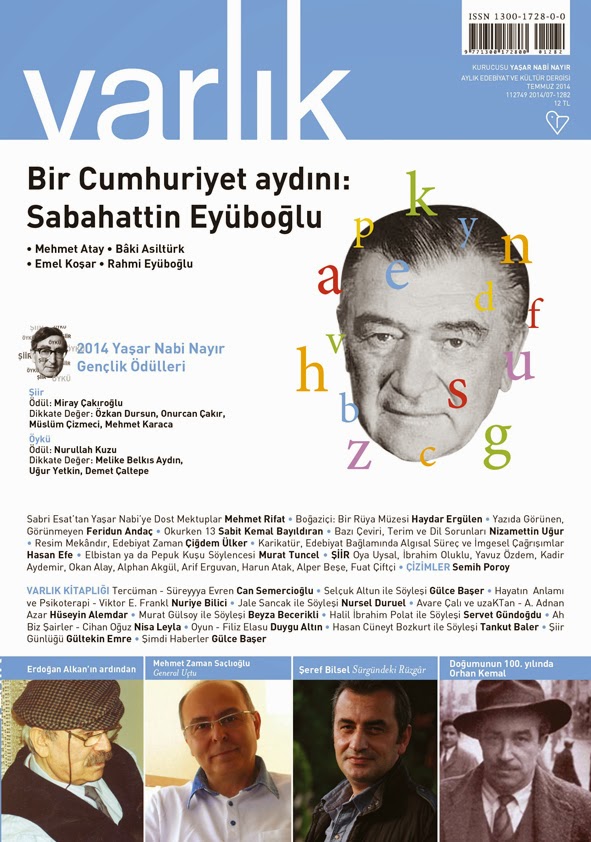Interview with Saskia Sassen: "Gezi is a kind of global event"
Can Semercioğlu
Mesele book review magazine has made an interview with Saskia Sassen, urban theorist and professor of sociology, on Gezi Park protests and urban struggles in the context of urban thought.
 Saskia Sassen is the Robert S.
Lynd Professor of Sociology and Co-Chair, The Committee on Global Thought,
Columbia University (www.saskiasassen.com). Her recent books are Territory,
Authority, Rights: From Medieval to Global Assemblages ( Princeton University
Press 2008), A Sociology of Globalization (W.W.Norton 2007), and the 4th
fully updated edition of Cities in a World Economy (Sage 2012). Among
older books is The Global City (Princeton University Press 1991/2001).
Her books are translated into over 20 languages. Her new book is Expulsions:
When complexity produces elementary brutalities. (Harvard University Press
2014). She is the recipient of diverse awards and mentions, ranging from
multiple doctor honoris causa to named lectures and being selected for various
honors lists. Most recently she was awarded the Principe de Asturias 2013 Prize
in the Social Sciences.
Saskia Sassen is the Robert S.
Lynd Professor of Sociology and Co-Chair, The Committee on Global Thought,
Columbia University (www.saskiasassen.com). Her recent books are Territory,
Authority, Rights: From Medieval to Global Assemblages ( Princeton University
Press 2008), A Sociology of Globalization (W.W.Norton 2007), and the 4th
fully updated edition of Cities in a World Economy (Sage 2012). Among
older books is The Global City (Princeton University Press 1991/2001).
Her books are translated into over 20 languages. Her new book is Expulsions:
When complexity produces elementary brutalities. (Harvard University Press
2014). She is the recipient of diverse awards and mentions, ranging from
multiple doctor honoris causa to named lectures and being selected for various
honors lists. Most recently she was awarded the Principe de Asturias 2013 Prize
in the Social Sciences.
Can Semercioglu (CS): How may
you interpret Gezi Park protests in general?
Saskia Sassen (SS): There is a shared
set of claims among the protest movements of the last two years. This in itself
is quite remarkable, given the sharp differences in situation between Spain,
Egypt, Greece, the US, Chile, Turkey, Brazil, and other countries that have
seen their people in the streets. Each of these movements has arrived at
protest through its own history and ecology of meanings; each comes out of a
specific history of opportunities and oppressions, with a different
understanding of what makes for a good society. But today, these diverse
histories converge on a couple of pivotal points.
First, it is a
protest against the state much more than it is against ‘capitalism’ or
multinational corporations, as was the case in the 1960s. Second, it is mostly
the modest middle classes, with modest aspirations and modest visions. It is
not the wealthy middle classes, who have gotten richer than they ever thought
they would be. Nor is it the syndicalists of the late 1800s and early 1900s, or
of the struggles that followed the world wars.
Elswehere I have
argued that this is perhaps the most revealing aspect: our current global epoch, with its vast complexity and
brutality on a perhaps unprecedented scale, has found its history-making actor:
the modest middle classes. I develop some of this in my new book Expulsions: Brutality and Complexity in the
Global Economy
CS: Gezi
protests has begun for a "park" and people from many backgrounds has
involved the protests. What may you say about the urban dynamics of Gezi
protests, in the context of worldwide urban protests?
SS: Most generally, the
city becomes a space where those without power can make a politics, a history.
The same people on a plantation would not make a politics—they would be
invisible. In the case of Gesi, the protests arise out of a specific condition
in the park, but they really were against the state because the state is
failing them – some version of what in Europe we call ‘austerity politics’ which
are hitting the middle classes hard, is also happening in Turkey and is one
important manifestation of this state failure. Their socioeconomic situation
has been eroded by neoliberal economic policies that have seen both wealth and
opportunity captured by a narrowing minority. This holds true in a broad array
of countries, although it is in liberal democracies where it is clearest. In
the Gesi case the threat was further
gentrification – renovating that area of the city for the rich top 20% (not
quite the top 1%).
CS: In
Turkey, urban transformation has been developing for years, especially in the
era of AKP (Justice and Development Party), the ruling party. And according to
a widely accepted opinion (they are also facts), people who are from lower
classes has suffered and relegated, on the other hand people who are from upper
classes and who are closer to AKP has had unearned incomes. From this point of
view, where do neo-liberal urbanization and right to the city stand?
SS: I would agree: the
data I have seen points to such trends. In my new book I argue that we are
dealing with “predatory formations” –mixes of
powerful elites and powerful technologies, bits of advanced lawyering
and creative accounting—which generate “legal” capture at the top and
impoverishment of the modest middle classes and working classes
CS: How may
you explain Istanbul as a globalizing city, given the fact that the strict
relationship between ruling party (AKP) and urban policies?
SS: You raise an
important point. What has become clear is that cities in countries with very
diverse political systems and party politics have all seen this capture of wealth
and income at the top and the expanded demand for high-cost urban space by an
expanded very rich upper middle class (which is barely a middle class), besides
the old rich. Cities as diverse as New York, Istanbul, Shanghai, Lagos, Sydney,
Sao Paulo, Singapore and many more are
now part of what I have described in my work on the global city as a geography
of centrality the cuts across the divide of global north and global south, secular and religion driven polities,
“democratic” and authoritatiran regimes, capitalism and communism, and so on.
For a fuller development your readers may want to look at my Cities in a World economy (4th
edition, 2012).
CS: What
kind of relation exists between global(izing) cities and the public space have,
for Istanbul? What kind of link between society and urban cities? How can
people lay claim to the cities?
SS: I could not address
the case of Istanbul, as I am not sufficiently familiar with this city. But in
the global cities I know of, the upgrading of public space is part of
gentrified urban areas, and it often goes along with the eliminating or
degradation of public urban space in poor areas.
CS: What
kind of urban transformation policy may be for the benefit of society today?
May you show us an example?
SS: I think one critical
dimension is distributive policy: that all neighborhoods have parks, and good quality public space, plus all the many
diverse facilities that one can find in the better and richer areas of a city.
CS: Do you
think that we will be witness to the urban struggles like Gezi? What is the
future of urban areas and urban struggles?
SS: As
I indicated at the start, I see this combination of
specific histories of contestation and the meaning of contestation with their happening in many different places
experiencing the impoverishment of the modest middle classes. This is a kind of
global event constituted via often very different local struggles in very diverse
cities. It gives a new , or added meaning to globalization.
* This interview published on Mesele book review Magazine, June issue.



Yorumlar
Yorum Gönder